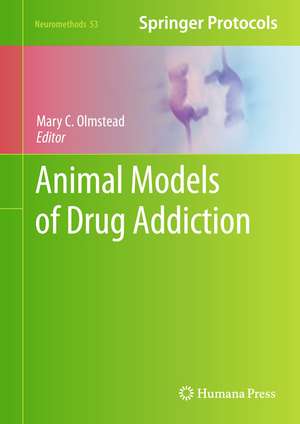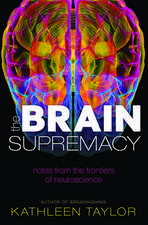Animal Models of Drug Addiction: Neuromethods, cartea 53
Editat de Mary C. Olmsteaden Limba Engleză Hardback – 10 dec 2010
| Toate formatele și edițiile | Preț | Express |
|---|---|---|
| Paperback (1) | 959.67 lei 6-8 săpt. | |
| Humana Press Inc. – 23 aug 2016 | 959.67 lei 6-8 săpt. | |
| Hardback (1) | 664.11 lei 6-8 săpt. | |
| Humana Press Inc. – 10 dec 2010 | 664.11 lei 6-8 săpt. |
Din seria Neuromethods
- 5%
 Preț: 347.58 lei
Preț: 347.58 lei - 15%
 Preț: 659.53 lei
Preț: 659.53 lei - 15%
 Preț: 665.08 lei
Preț: 665.08 lei - 18%
 Preț: 986.63 lei
Preț: 986.63 lei - 18%
 Preț: 953.03 lei
Preț: 953.03 lei - 18%
 Preț: 955.25 lei
Preț: 955.25 lei - 20%
 Preț: 1129.39 lei
Preț: 1129.39 lei - 20%
 Preț: 1252.07 lei
Preț: 1252.07 lei - 18%
 Preț: 1291.45 lei
Preț: 1291.45 lei - 15%
 Preț: 652.31 lei
Preț: 652.31 lei - 18%
 Preț: 955.70 lei
Preț: 955.70 lei - 23%
 Preț: 705.40 lei
Preț: 705.40 lei - 18%
 Preț: 973.38 lei
Preț: 973.38 lei - 18%
 Preț: 964.86 lei
Preț: 964.86 lei - 18%
 Preț: 968.03 lei
Preț: 968.03 lei - 15%
 Preț: 662.95 lei
Preț: 662.95 lei - 15%
 Preț: 646.43 lei
Preț: 646.43 lei - 15%
 Preț: 649.71 lei
Preț: 649.71 lei -
 Preț: 395.29 lei
Preț: 395.29 lei - 19%
 Preț: 580.68 lei
Preț: 580.68 lei - 19%
 Preț: 584.13 lei
Preț: 584.13 lei - 19%
 Preț: 566.41 lei
Preț: 566.41 lei - 15%
 Preț: 652.17 lei
Preț: 652.17 lei - 15%
 Preț: 655.13 lei
Preț: 655.13 lei - 18%
 Preț: 1009.58 lei
Preț: 1009.58 lei - 18%
 Preț: 959.36 lei
Preț: 959.36 lei - 15%
 Preț: 652.49 lei
Preț: 652.49 lei - 15%
 Preț: 649.54 lei
Preț: 649.54 lei - 15%
 Preț: 649.87 lei
Preț: 649.87 lei - 15%
 Preț: 650.19 lei
Preț: 650.19 lei - 15%
 Preț: 648.42 lei
Preț: 648.42 lei - 18%
 Preț: 1039.22 lei
Preț: 1039.22 lei - 18%
 Preț: 963.15 lei
Preț: 963.15 lei
Preț: 664.11 lei
Preț vechi: 781.31 lei
-15% Nou
Puncte Express: 996
Preț estimativ în valută:
127.09€ • 138.00$ • 106.76£
127.09€ • 138.00$ • 106.76£
Carte tipărită la comandă
Livrare economică 22 aprilie-06 mai
Preluare comenzi: 021 569.72.76
Specificații
ISBN-13: 9781607619338
ISBN-10: 1607619334
Pagini: 520
Ilustrații: XII, 484 p.
Dimensiuni: 178 x 254 x 43 mm
Greutate: 1.08 kg
Ediția:2011
Editura: Humana Press Inc.
Colecția Humana
Seria Neuromethods
Locul publicării:Totowa, NJ, United States
ISBN-10: 1607619334
Pagini: 520
Ilustrații: XII, 484 p.
Dimensiuni: 178 x 254 x 43 mm
Greutate: 1.08 kg
Ediția:2011
Editura: Humana Press Inc.
Colecția Humana
Seria Neuromethods
Locul publicării:Totowa, NJ, United States
Public țintă
Professional/practitionerCuprins
Intracranial Self-Stimulation.- Stimulant Self-Administration.- Opiate Self-Administration.- Nicotine Self-Administration.- Alcohol Self-Administration.- Place Conditioning.- Sensitization.- Animal Models of Eating Disorders.- Acquisition of Drug Self-Administration.- Escalation of Drug Use.- Environmental Modulation of Drug-Taking.- Craving.- Habit Formation and Compulsion.- Impulsivity.- Binge Drug-Taking.- Withdrawal.- Relapse.
Recenzii
From the reviews:
“This is an up-to-date review of the various animal models that are used to help researchers … . Written for readers familiar with preclinical research in addiction, the book will be extremely useful for those who need to gain a better understanding of the research available demonstrating the neurobiology of addictions. … an invaluable reference and is a must for those who wish to comprehend the preclinical data that is the basis for our scientific understanding of addictions.” (Michael Easton, Doody’s Review Service, July, 2011)
“This is an up-to-date review of the various animal models that are used to help researchers … . Written for readers familiar with preclinical research in addiction, the book will be extremely useful for those who need to gain a better understanding of the research available demonstrating the neurobiology of addictions. … an invaluable reference and is a must for those who wish to comprehend the preclinical data that is the basis for our scientific understanding of addictions.” (Michael Easton, Doody’s Review Service, July, 2011)
Textul de pe ultima copertă
Our understanding of addiction and how it is treated has advanced remarkably over the past decades, and much of the progress is related directly to animal research. This is true for both the behavioural aspects of drug use as well as the biological underpinnings of the disorder. In Animal Models of Drug Addiction, experts in the field provide an up-to-date review of complex behavioural paradigms that model different stages of this disorder and explain how each test is used to effectively replicate the progression of drug addiction. This detailed and practical book begins with the most common laboratory measures of addiction in animals, including intracranial self-stimulation (ICSS), drug self-administration, place conditioning, and sensitization. Later chapters describe how these paradigms are used to model the progression of drug addiction, providing insight into the clinical symptomatology of addiction from acquisition of drug use through compulsive drug taking to withdrawal and relapse. Written for the popular Neuromethods series, the contributions offer both methodological detail and a theoretical perspective, appealing to readers familiar with preclinical research on drug addiction as well as those who are newcomers to the field.Cutting-edge and authoritative, Animal Models of Drug Addiction will serve as a basis for future vital research that links the bench to the bedside in the crucial treatment of drug addiction.
Caracteristici
Provides both methodological detail and a theoretical perspective in order to appeal to a wide base of readers Tackles the current major challenge of the field: translation of laboratory findings to therapeutic tools Presents step-by-step, clear and precise protocols for the lab Includes supplementary material: sn.pub/extras












